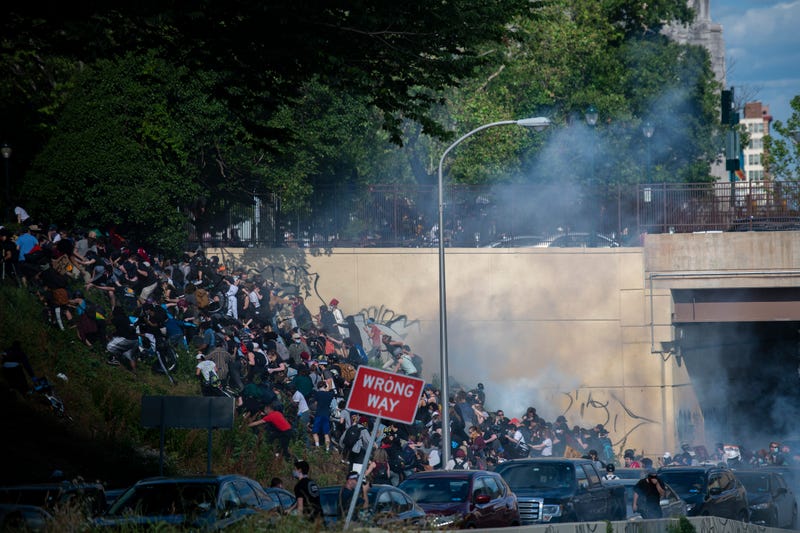
PHILADELPHIA (KYW Newsradio) — The City of Philadelphia has reached a settlement with protesters and others who say they were physically and emotionally injured by police tactics during 2020’s George Floyd protests.
The city agreed to pay $9.25 million in the class action lawsuit, the Legal Defense Fund announced Monday.
The lawsuit, filed in July 2020, challenged the Philadelphia Police Department’s response to protests in West Philadelphia and along the Vine Street Expressway that same month. Police used rubber bullets and pepper balls on protesters in the neighborhood of 52nd and Market streets, the lawsuit says. Officers also deployed tear gas during a massive march along I-676.
Protesters, residents and others claimed they were left with physical and emotional injuries.
“The absurdity of being the subject of police brutality — during a protest against police brutality — was not lost on us,” said one of the recipients. Ed, who withheld his last name, says he has had several surgeries to correct nerve damage in his wrists from being zip-tied during the protest three years ago.
“This settlement has shown me that change is possible, and the system has the resources to do so.”
The $9.25 million of taxpayers’ money will be distributed among more than 340 plaintiffs. The Legal Defense Fund said this settlement is one of the largest of its kind in the city’s history.
Related podcast
Hear the chaos on I-676 in this 2020 KYW Newsradio In Depth episode:
“The pain and trauma caused by a legacy of systemic racism and police brutality against Black and Brown Philadelphians is immeasurable,” Mayor Jim Kenney said Monday in a statement. “While this is just one step in the direction toward reconciliation, we hope this settlement will provide some healing.”
Under the agreement, the city will also grant $500,000 to $600,000 to the Bread & Roses Community Fund to provide free mental health counseling for West Philadelphia residents. The counseling is available to all within a certain radius of the 52nd Street corridor, not just those named in the lawsuit.
“It will both be for mental and wellness services, but also more generally for community-based programming,” said Cara McClellan, with the Legal Defense Fund.
“There is also an agreement within the commitment that, twice per year, a deputy commissioner from the Police Department will host meetings within West Philadelphia,” McClellan said. The purpose will be to report on police use-of-force data, and the meetings will be open to members of the public to attend and ask questions about policies and statistics.
“That was really important, to have the opportunity to ask questions and provide feedback about responses and the data, as well,” McClellan said.
Also part of the settlement: The Philadelphia Police Department has agreed to give back military-style weapons on loan from the federal government.
Plaintiffs’ attorney Kevin Mincey says he hopes the settlement is the beginning of change for police conduct:
“It’s got to be more than words and papers signed as a result of a lawsuit, or there will be more lawsuits and more settlements — and the money that is spent on these settlements will continue to go up — because they have to show a dedicated commitment to making the changes required,” Mincey said.
In separate statements, Mayor Jim Kenney and Police Commissioner Danielle Outlaw said they were proud of the changes so far, and said they are working to continue to implement new police reform.
“The mass demonstrations that took place in Philadelphia and across the nation in response to the murder of George Floyd were unprecedented in scope,” Police Commissioner Danielle Outlaw added in a statement.
“The Philadelphia Police Department is a learning organization, and we remain dedicated to moving forward in meaningful and productive ways. Along with city, state, and community stakeholders, we will continue to work non-stop towards improving what we as police do to protect the First Amendment rights of protestors, keep our communities and officers safe, and to ultimately prove that we are committed to a higher standard.”



